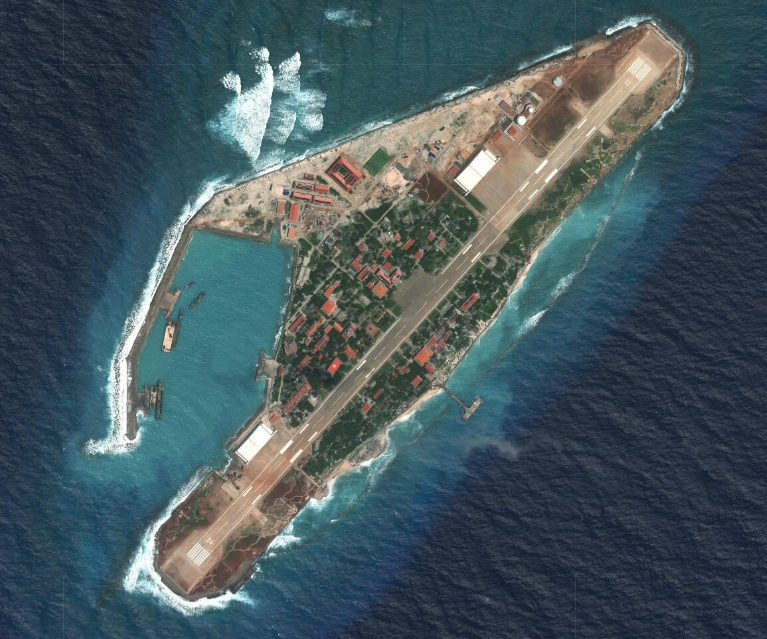By Perfecto Caparas
In the face of China’s continuing illegal occupation of geologic features in the Philippines’ exclusive economic zone (EEZ), Manila must fight back and peacefully assert The Hague arbitral award.
Manila’s inviolable EEZ rights
In formulating her policy positions and strategies, particularly with respect to the 4 Chinese-held reefs in the Spratly Islands forming part of her own EEZ – Mischief Reef; Johnson Reef; McKennan Reef; and Hughes Reef – Manila needs to follow through and assert Article 56 (1) of the UN Convention on the Law of the Sea (UNCLOS). This provision on Rights, jurisdiction and duties of the coastal State in the exclusive economic zone states:
“In the exclusive economic zone, the coastal State has:
(a) sovereign rights for the purpose of exploring and exploiting, conserving and managing the natural resources, whether living or non-living, of the waters superjacent to the seabed and of the seabed and its subsoil, and with regard to other activities for the economic exploitation and exploration of the zone, such as the production of energy from the water, currents and winds;
(b) jurisdiction as provided for in the relevant provisions of this Convention with regard to:
(1) the establishment and use of artificial islands, installations and structures;
(2) marine scientific research;
(3) the protection and preservation of the marine environment;
(c) other rights and duties provided for in this Convention.”
Post-arbitration policy framework
The five-member Ad Hoc Arbitral Tribunal constituted under Annex VII of the 1982 UN Convention on the Law of the Sea (UNCLOS) has exposed Beijing’s fictional 9-dash line as nothing but a sham, a fraud, bereft of any factual, historic, and legal leg to stand on.
In its final and legally binding arbitral award, the tribunal ruled as follows:
- “as between the Philippines and China, the Convention defines the scope of maritime entitlements in the South China Sea, which may not extend beyond the limits imposed therein”;
- “as between the Philippines and China, China’s claims to historic rights, or other sovereign rights or jurisdiction, with respect to the maritime areas of the South China Sea encompassed by the relevant part of the ‘nine-dash line’ are contrary to the Convention and without lawful effect to the extent that they exceed the geographic and substantive limits of China’s maritime entitlements under the Convention”; and
- “that the Convention superseded any historic rights, or other sovereign rights or jurisdiction, in excess of the limits imposed therein”.
Manila’s overarching foreign policy and legal framework must embody these key rulings In the Matter of the South China Sea Arbitration award rendered by the arbitral tribunal on 12 July 2016.
Congressional resolution
Pursuant to the 1987 Constitution, the Philippine Senate and House of Representatives need to pass resolutions vigorously and unequivocally asserting Manila’s sovereignty over her own territorial sea and sovereign rights and jurisdiction over her own EEZ.
Section 2, Article XII (National Economy and Patrimony) of the 1987 Constitution provides:
“The State shall protect the nation’s marine wealth in its archipelagic waters, territorial sea, and exclusive economic zone, and reserve its use and enjoyment exclusively to Filipino citizens.”
As the one primarily in charge of the country’s foreign policy, the Philippine Chief Executive, along with Congress, needs to immediately and explicitly direct the Department of Foreign Affairs to take the lead in strategizing and ensuring that all diplomatic and legal enforcement measures are threshed out, outlined, and developed into coherent and strategic foreign policy positions and declarations.
Manila’s policies must fully and peacefully implement and enforce the arbitral award to safeguard Philippine national patrimony in the immediate, medium- and long-term, on all fronts.
These must be formally formulated and critiqued with the help of various stakeholders, particularly governmental organs, military commands, scientists, experts, citizens – particularly fisherfolks – and civil society organizations.
The government needs to convene such a multi-sectoral group tasked to carry out this mandate.
Opposing Chinese occupation
Unequivocally, these policy and legal positions need to be adopted, articulated, and transmitted, through diplomatic channels, to China by proper offices of the government to further preserve and protect Philippine rights in perpetuity.
The President and both Houses of Congress, along with the Supreme Court, are legally bound by the 1987 Philippine Constitution and UNCLOS to fulfill this compelling duty relative to the In the Matter of the South China Sea Arbitration case.
Amid Beijing’s brazenness, Manila must resolutely defend her sovereignty over her own territorial waters as well as sovereign rights and jurisdiction over her EEZ, especially in the West Philippine Sea.
About the writer:
 Perfecto Caparas. Writes regularly for Pressenza and Pinoy Publiko. He served as a journalist of The Manila Times, Ang Pahayagang Malaya, The Philippine Post, Pinoy Gazette, UCANews, and ISYU Newsmagazine. He is a licensed attorney and lifetime member of the Integrated Bar of the Philippines.
Perfecto Caparas. Writes regularly for Pressenza and Pinoy Publiko. He served as a journalist of The Manila Times, Ang Pahayagang Malaya, The Philippine Post, Pinoy Gazette, UCANews, and ISYU Newsmagazine. He is a licensed attorney and lifetime member of the Integrated Bar of the Philippines.






